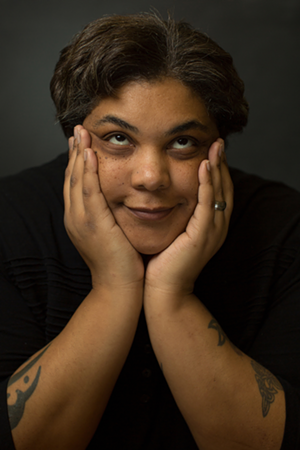Author Roxane Gay’s latest book — after her essay collection Bad Feminist became a New York Times bestseller — is Hunger: A Memoir of (My) Body, in which she reveals the largest piece of herself yet.
A Purdue University professor, feminist commentator and voice of reason on social media, she here challenges society once again, but also reveals much about herself and how her life has shaped her views of society.
Using her body as a memoir, she shows how our stretch marks, cellulite, scars and tattoos bear the weight of the life we’ve lived. Gay’s body has survived trauma, loved and been loved, experienced adoration and persevered in the critical spotlight.
Through her memoir, she shares experiences and addresses race, relationships, feminism and body prejudice.
A huge revelation is Gay’s experience as a rape victim (her preferred terminology). The story is heart-wrenching and warped Gay’s formative years as she entered her teens.
That violence forever changed the way she views her body and how she interacts with the world. Indirectly, Gay connects two important feminist issues: body prejudice and the victim blaming and sexism that persist in rape culture.
“When I was 12 years old I was raped and then I ate and ate and ate to build my body into a fortress. I was a mess and then I grew up and away from that terrible day and became a different kind of mess — a woman doing the best she can to love well and be loved well, to live well and be human and good,” she writes.
Since Bad Feminist was released, Gay has been an important and intersectional voice in the Feminist movement — a voice that is unafraid to point out hypocrisies or to venture into gray areas. Hunger has only been out since June, but with the problematic depictions of bodies in films (Feed, To the Bone) and television, from eating to sexual assault, we need to know about a nonfiction narrative that is raw, authentic and self-aware.
It’s time to see other bodies and the complicated relationship between self-love, societal pressure and personal health. Gay’s memoir and voice guide us through a new narrative where people can find support and bear witness to her journey. She opens up about how she wears society’s binding corset without letting it shrink her personhood.
Gay reclaims the word “fat,” and she argues that people don’t need to be conventionally beautiful to earn humanity and avoid harassment. And she acknowledges that self-love is a battle fought against internalized notions of beauty, well-meaning family members and strangers.
At the same time, she also treads the tightrope between how a body-positive feminist should feel and the realities of this world. “I hate that I am letting down so many women when I cannot embrace my body at any size,” she writes. “On my better days, when I feel up to the fight, I want to change how this world responds to how I look because intellectually I know my body is not the real problem. On bad days, though, I forget how to separate my personality, the heart of who I am, from my body. I forget how to shield myself from the cruelties of the world.”
Her confessional writing style allows her to make what has happened in her life apply to others. Despite the heavy subjects that Gay relates, she entertains with her dry wit and a blunt voice that cuts through the bullshit. Her revelations and shrewd observations can make some readers uncomfortable, and they should. Growth requires discomfort.
And yet, there is a resonance in Gay’s journey to rehome her body that is universal and intimate. For women who’ve had similar experiences, her book is a comfort that says, “I’m struggling, too. But look at how we can grow together.”
There’s a hunger on display here to be more than the expectations placed on her, more than the perfect student her family pressured her to be and more than her experiences.
“My father believes hunger is in the mind,” she writes. “I know differently. I know that hunger is in the mind and the body and the heart and the soul.”
Consume Hunger and your spirit will feel fully whole. ©


